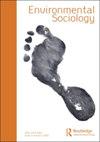土著人民与纳入绿色气候基金
IF 2.8
Q3 ENVIRONMENTAL STUDIES
引用次数: 0
摘要
在本文中,我们探讨土著人民在绿色气候基金中的参与和包容。我们依赖于简单的包容和对土著人民的贡献的更深层次的承认之间的区别,这种贡献被称为认知归属。我们分析了组织的相互依赖性,即行动者之间的资源交换和评估,以及不同行动者的贡献之间的潜在冲突如何影响土著人民在多大程度上实现认知归属。为了说明这一点,我们分析了围绕绿色气候基金(GCF)土著人民政策(IPP)建立的斗争和紧张局势,以及IPP在资助提案讨论和决策中的实际应用。我们的结论是,只要土著人民不挑战其他重要的绿色气候基金利益,他们的贡献是有价值的。不同行为体的捐款之间存在冲突,因此需要优先考虑那些帮助绿色气候基金开发、实施和管理气候项目的认可实体提供的资源。因此,土著人民的贡献变得从属,这对充分的认知归属构成了障碍。本文章由计算机程序翻译,如有差异,请以英文原文为准。
Indigenous peoples and inclusion in the green climate fund
ABSTRACT In this paper, we explore Indigenous peoples’ engagement and inclusion in the Green Climate Fund. We rely on the distinction between simple inclusion and a deeper recognition of Indigenous peoples’ contributions, described as epistemic belonging. We analyse how organizational interdependencies, i.e. the exchange and valuation of resources between actors, and how the potential conflicts between contributions from different actors may influence to what degree Indigenous peoples can achieve epistemic belonging. To illustrate this we have analysed the struggles and tensions around the establishment of the Indigenous People Policy (IPP) of the Green Climate Fund (GCF), and the practical use of the IPP in funding proposal discussions and decisions. We conclude that Indigenous peoples’ contributions are valued as long as they do not challenge other important GCF interests. Conflicts between contributions from different actors lead to a prioritization of recourses provided by accredited entities that help the GCF to develop, implement and manage climate projects. Hence, Indigenous peoples’ contributions become subordinated which provides an obstacle to full epistemic belonging.
求助全文
通过发布文献求助,成功后即可免费获取论文全文。
去求助
来源期刊

Environmental Sociology
ENVIRONMENTAL STUDIES-
CiteScore
4.60
自引率
12.00%
发文量
34
期刊介绍:
Environmental Sociology is dedicated to applying and advancing the sociological imagination in relation to a wide variety of environmental challenges, controversies and issues, at every level from the global to local, from ‘world culture’ to diverse local perspectives. As an international, peer-reviewed scholarly journal, Environmental Sociology aims to stretch the conceptual and theoretical boundaries of both environmental and mainstream sociology, to highlight the relevance of sociological research for environmental policy and management, to disseminate the results of sociological research, and to engage in productive dialogue and debate with other disciplines in the social, natural and ecological sciences. Contributions may utilize a variety of theoretical orientations including, but not restricted to: critical theory, cultural sociology, ecofeminism, ecological modernization, environmental justice, organizational sociology, political ecology, political economy, post-colonial studies, risk theory, social psychology, science and technology studies, globalization, world-systems analysis, and so on. Cross- and transdisciplinary contributions are welcome where they demonstrate a novel attempt to understand social-ecological relationships in a manner that engages with the core concerns of sociology in social relationships, institutions, practices and processes. All methodological approaches in the environmental social sciences – qualitative, quantitative, integrative, spatial, policy analysis, etc. – are welcomed. Environmental Sociology welcomes high-quality submissions from scholars around the world.
 求助内容:
求助内容: 应助结果提醒方式:
应助结果提醒方式:


